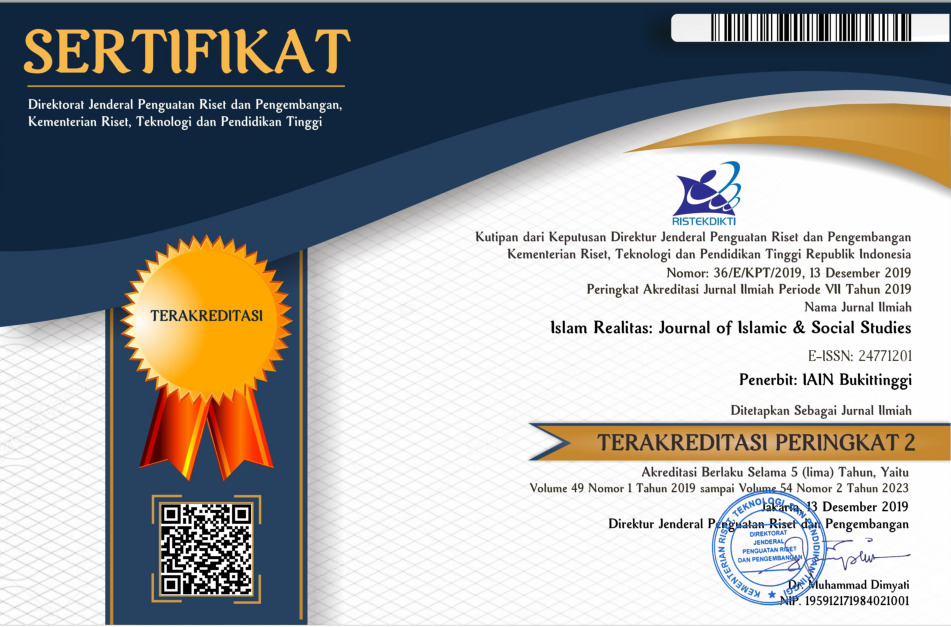Preventing and Countering Violent Extremism: Lessons from Selected Muslim Countries
Downloads
This paper explains the efforts of three Muslim countries, namely Yemen, Saudi Arabia and Malaysia in preventing and fighting against violence from jihadist extremism groups. De-radicalization program is understood as a process of changing the attitudes of former prisoners of terrorism to reject radicalism as a religious or political ideology that destroys national stability, and affects political and economic stability and even threatens human life. By using a qualitative approach, it was found that many countries have taken a significant approaches in dealing with the threat of terrorism through de-radicalization programs, especially in Yemen, Saudi Arabia and Malaysia. Most de-radicalisation programs are based on education and recovery. Education has the character of correcting misconceptions of politics and religion in militant activities, while the recovery strategy is more about continuous monitoring after liberation. The deradicalisation module aims at assisting these contries in militant recovery activities and also support their personal development. This paper explains the theoretical methods used in the de-radicalization programs in these three Islamic countries in the rehabilitation program. These countries use a set of tools that considers relevant factors such as holistic personality, self-reflection, social skills, criminal behavior, spirituality, security, and psychology.
Tulisan ini menjelaskan bagaimana upaya pencegahan dan perlawanan terhadap kekerasan kelompok ekrimisme Jihadis berdasarkan pengalaman 3 negara Muslim yaitu Yemen, Saudi Arabia dan Malaysia.  Program deradikalisasi dipahami sebagai proses mengubah perilaku tahanan terrorisme untuk menolak radikalisme sebagai ideologi agama atau politik yang merusak stabilitas nasional, dan berpengaruh terhadap kestabilan politik dan ekonomi dan bahkan ancaman kepada kehidupan manusia. Dengan menggunakan pendekatan kualitatif, ditemukan bahwa banyak negara telah mengambil pendekatan yang signifikan dalam menghadapi ancaman terrorisme melalui program deradikalisasi terutama di Yemen, Saudi Arabia dan Malaysia. Kebanyakkan program deradikalisasi berasaskan pendidikan dan pemulihan. Pendidikan bersifat memperbaiki salah faham konsep berpolitik dan beragama dalam aktiviti militan, manakala strategi pemulihan lebih kepada pemantauan secara berterusan selepas pembebasan. Modul deradikalisasi bertujuan membantu kerajaan dalam kegiatan pemulihan militan dan juga membantu pembinaan personaliti mereka. Tulisan ini juga menjelaskan teoritikal metod yang digunakan dalam program deradikalisasi di tiga buah negara Islam ini dalam program rehabilitasi dengan menggunakan pendekatan personaliti holistik, pembinaan kendiri, skil-sosial, penjenayahan, kerohanian, toleransi, keselamatan dan psikologi.
Books
Aslam, Mohd Mizan, The Role of CSO: Malaysia’s Experience (Kuala Lumpur, The Malay Press, 2019)
---------, Rohan Gunaratna and Hussin M.S, A Model of Deradicalisation in Malaysia, International Case Studies of Terrorist Rehabilitation, (London: Routledge, 2018) <https://doi.org/10.4324/9780429468445-8>
----------, A Critical Study of Kumpulan Militant Malaysia, Its Wider Connections in the Region and the Implications of Radical Islam for the Stability of Southeast Asia (New Zealand: Victoria University of Wellington, , 2009)
Chasdi, Richard J., Corporate Security Crossroads; Responding to Terrorism Cyberthreats, and Other Hazards in the Global Business Environment (UK: ABC-CLIO, 2018)
Gunaratna, R, and M B Ali, Terrorist Rehabilitation: A New Frontier In Counter-Terrorism, Imperial College Press Insurgency And Terrorism Series (UK: World Scientific Publishing Company, 2015)
-------------, and Mohd Mizan Aslam, Terrorist Rehabilitation and Community Engagement in Southeast Asia, Terrorist Rehabilitation and Community Engagement in Malaysia and Southeast Asia (London: Routledge, 2019) <https://doi.org/10.4324/9780367817466-2>
Koehler, Daniel, Understanding Deradicalization: Methods, Tools and Programs for Countering Violent Extremism, European Heart Journal, Contemporary Terrorism Studies (UK: Taylor & Francis, 2006)
Noor, Saba, and Shagufta Hayat, Deradicalization : Approaches and Models (Jakarta: Pak Institute of Peace Studies, 2009)
Qadri, Hussain Mohi-ud-Din, Countering Extremism and Building Social Resilience Through Community Engagement: South Asian Models, Imperial College Press Insurgency And Terrorism Series (UK: World Scientific Publishing Company, 2013) <https://doi.org/10.1142/9781908977540_0003>
Veldhuis, Tinka, and Jørgen Staun, Islamist Radicalisation: A Root Cause Model, Clingendael Security Paper (Amsterdam: Nederlands Instituut voor Internationale Betrekkingen ‘Clingendael’, 2009)
Journals
Aslam, Mohd Mizan, ‘The Threat of Daesh in Universities: Malaysia’s Experience’, A Journal of the International Centre for Political Violence and Terrorism Research, 9 (2017), 13–16
Hartmann, Christina, ‘Who Does (Not) Belong to the Jihadis’ Umma? A Comparison of IS’s and Al Qaida’s Use of Takfīr to Exclude People from the Muslim Community.’, Journal for Deradicalization, 2017, 213–42
Mahmud, Nik Anuar Nik, ‘Krisis Sempadan Thailand-Indochina Dan Reaksi British’, Jebat: Malaysian Journal of History, Politics and Strategic Studies, 26 (1999), 73–83
Mink, Charles, ‘It’s About the Group, Not God: Social Causes and Cures for Terrorism’, Journal for Deradicalization, 5 (2015), 63–91
Moghaddam, Fathali M, ‘The Staircase to Terrorism: A Psychological Exploration.’, American Psychologist, 60 (2005), 161
Neo, Jaclyn Ling-Chien, ‘Malay Nationalism, Islamic Supremacy and the Constitutional Bargain in the Multi-Ethnic Composition of Malaysia’, International Journal on Minority and Group Rights, 13 (2006), 95–118
Neumann, Peter R., ‘The Trouble with Radicalization’, International Affairs, 89 (2013), 873–93 <https://doi.org/10.1111/1468-2346.12049>
Porter, Elisabeth, ‘Rethinking Women’s Empowerment’, Journal of Peacebuilding & Development, 8 (2013), 1–14
Pouw, Nicky R.M., and Ad De Bruijne, ‘Strategic Governance for Inclusive Development’, European Journal of Development Research (Springer, 2015), 481–87 <https://doi.org/10.1057/ejdr.2015.53>
Putra, I.E., F. Erikha, R.S. Arimbi, and A. Rufaedah, ‘Increasing Integrative Complexity on Convicted Terrorists in Indonesia’, Social Psychology and SocietyÐ¡Ð¾Ñ†Ð¸Ð°Ð»ÑŒÐ½Ð°Ñ ÐŸÑÐ¸Ñ…Ð¾Ð»Ð¾Ð³Ð¸Ñ Ð¸ ОбщеÑтво, 9 (2018), 35–45 <https://doi.org/10.17759/sps.2018090203>
Rufaedah, Any, and Idhamsyah Eka Putra, ‘Coping with Stigma and Social Exclusion of Terror-Convicts’ Wives in Indonesia: An Interpretative Phenomenological Analysis’, Qualitative Report, 23 (2018), 1334–46
Striegher, Jason-Leigh, ‘The Deradicalisation of Terrorists’, Salus Journal, 1 (2013), 19–40
Sumpter, Cameron, ‘Countering Violent Extremism in Indonesia: Priorities, Practice and the Role of Civil Society’, Journal for Deradicalization, Summer (2017), 112–47
Yousif, Ahmad F., ‘Islamic Revivalism in Malaysia’, American Journal of Islamic Social Sciences, 21 (2004), 30–56 <https://doi.org/10.35632/ajiss.v21i4.512>
Yusof, Abdullah, and Siti Norfariza Mohd Tawel, ‘Penganjuran Tilawah L-Quran Peringkat Antarabangsa: Sejarah dan Perkembangannya’, Journal of Al-Tamaddun, 8 (2013), 15–25 <https://doi.org/10.22452/jat.vol8no2.2>
Zain, Norliza Mohd, Velantina Aspah, Normazni Abdullah, and Mansoureh Ebrahimi, ‘Challenges and Evolution of Higher Education in Malaysia’, UMRAN-International Journal of Islamic and Civilizational Studies, 4 (2017)
Report, news and interview
Ashour, O., ‘Deradicalization Revisited’, Washingtonpost , Washington, 2015
Rusnan, Mustafa, ‘Banteras Jenayah Rentas Sempadan’, Utusan, 2017
Silber, Mitchell D, and Arvin Bhat, ‘Radicalization in the West: The Home-grown Threat’ The NYPD Jihadist Report’, 2007
Zulkifli Omar (Director General of Prison Department of Malaysia) Interview, {Thursday, 17 March 2018 at Kajang Prison, Selangor}
Authors who publish with this journal agree to the following terms:
- Authors retain copyright and grant the journal right of first publication with the work simultaneously licensed under a Creative Commons Attribution License that allows others to share the work with an acknowledgment of the work's authorship and initial publication in this journal.
- Authors are able to enter into separate, additional contractual arrangements for the non-exclusive distribution of the journal's published version of the work (e.g., post it to an institutional repository or publish it in a book), with an acknowledgment of its initial publication in this journal.
- Authors are permitted and encouraged to post their work online (e.g., in institutional repositories or on their website) prior to and during the submission process, as it can lead to productive exchanges, as well as earlier and greater citation of published work (See The Effect of Open Access).









